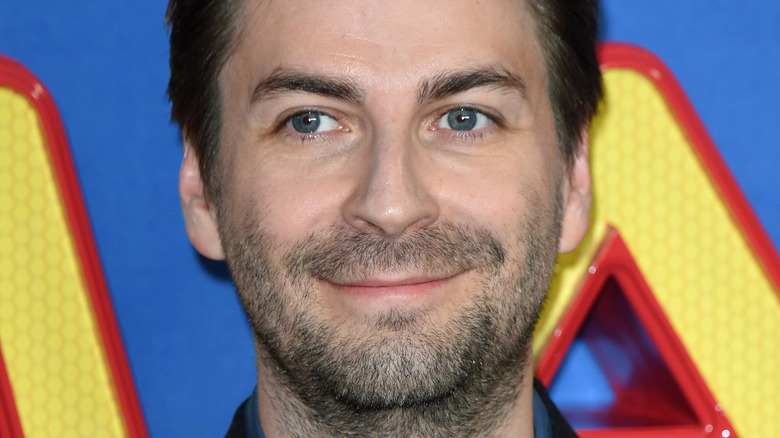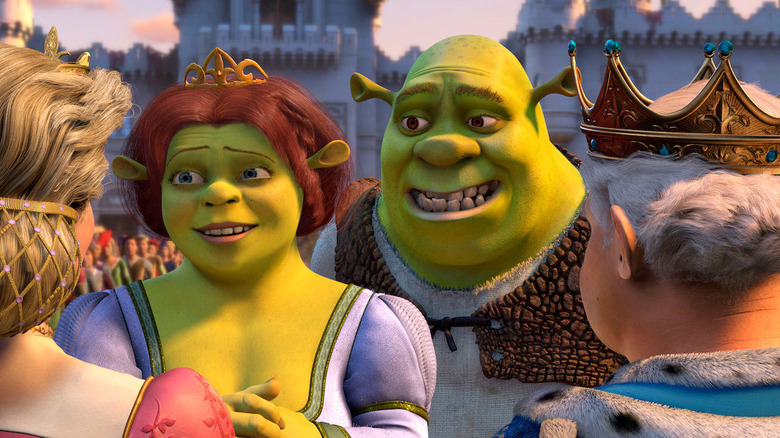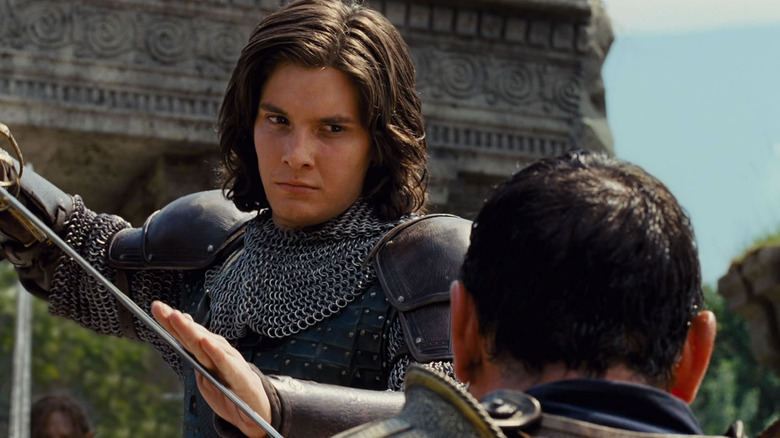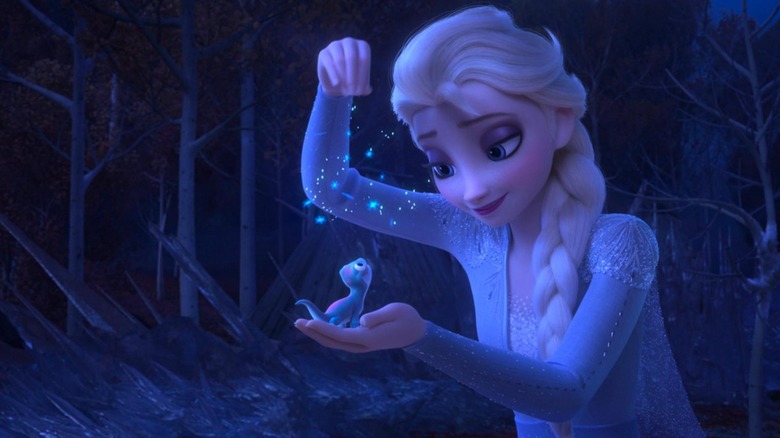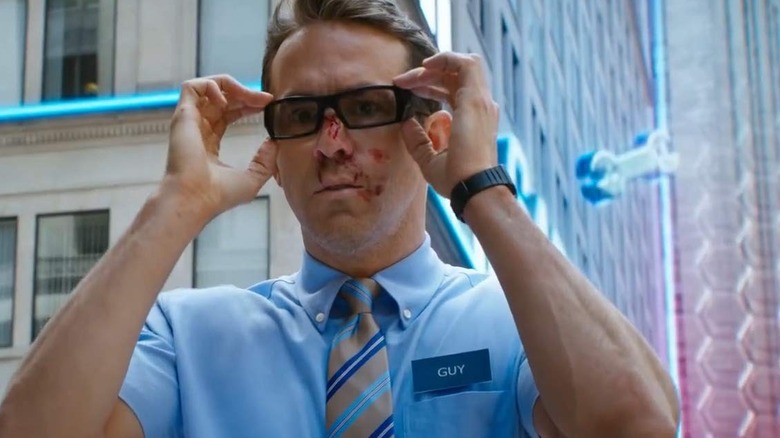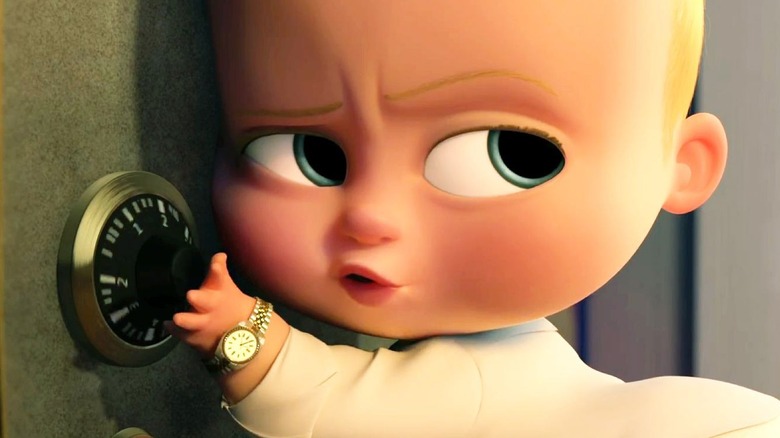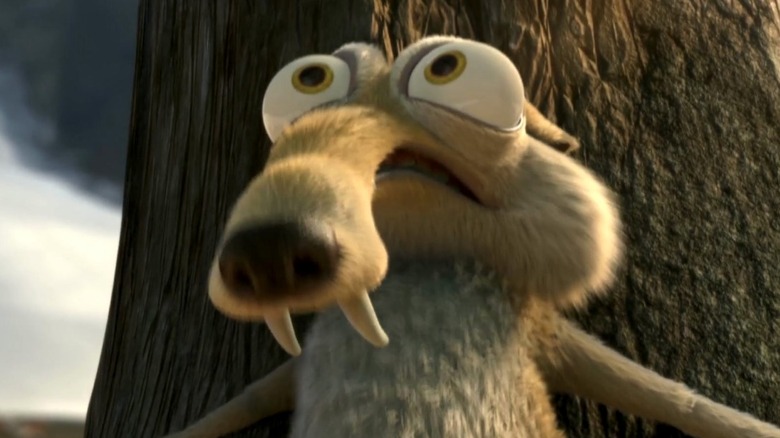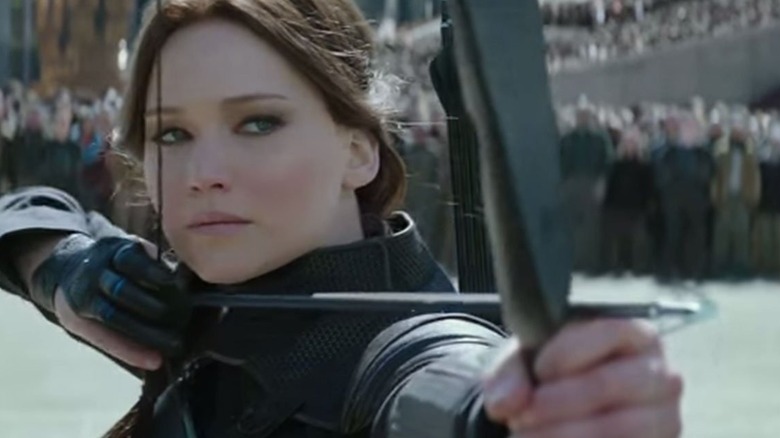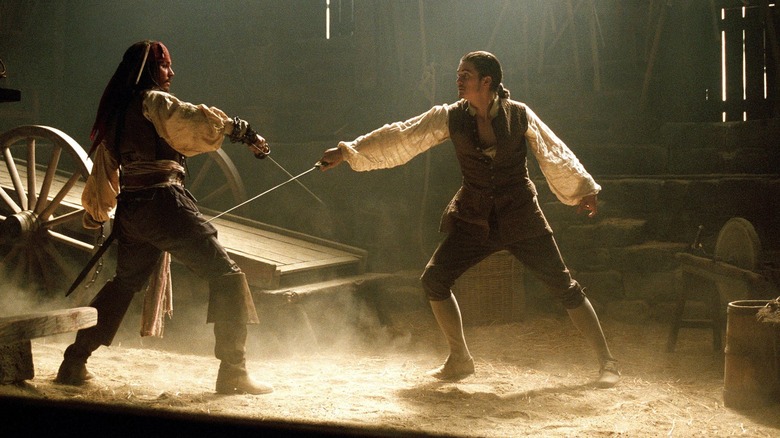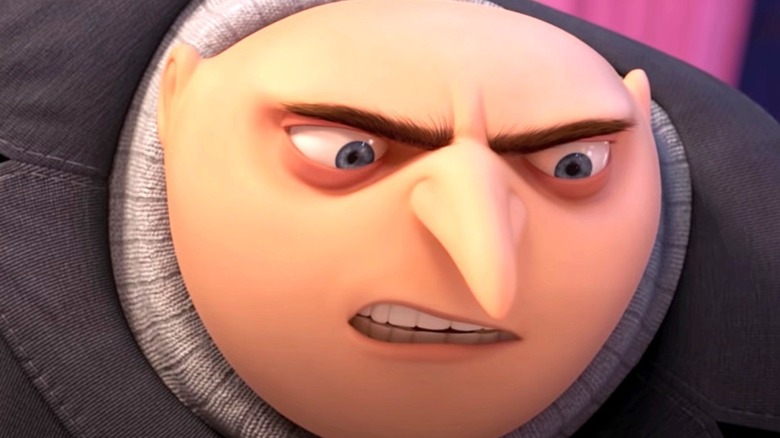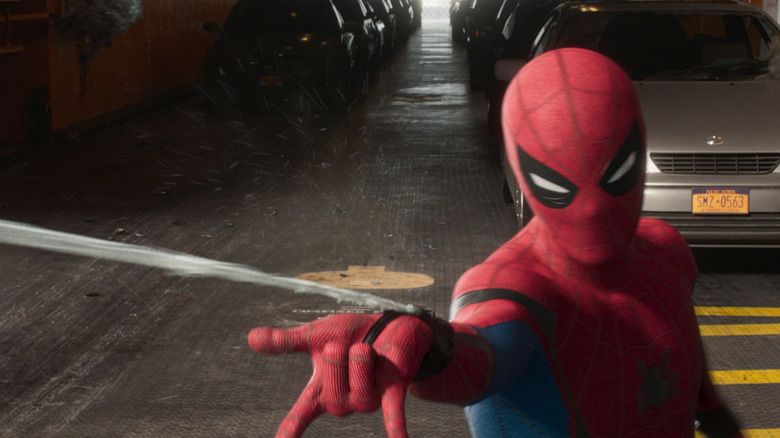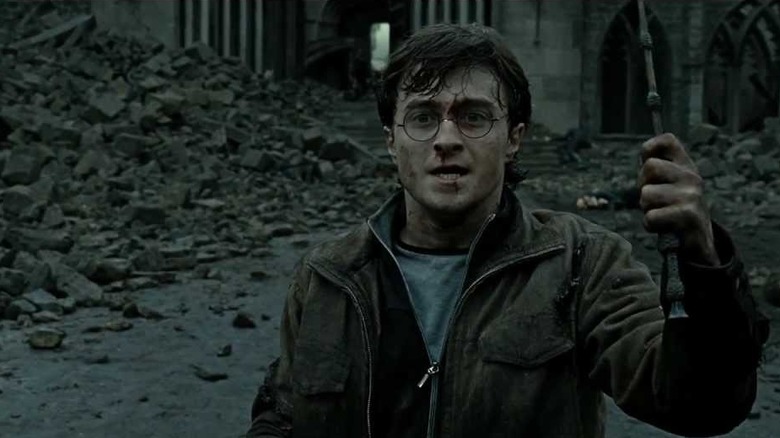Successful Hollywood Directors Who Aren't Household Names
Steven Spielberg. Peter Jackson. James Cameron. Christopher Nolan. You know their names. They are some of the highest-grossing directors of all time (via The Numbers), and brands unto themselves. When a studio markets a movie as "A Christopher Nolan Film," they're taking for granted that Nolan is a household name and moviegoers know what they are going to get — in Nolan's case, most likely a mix of confusion and excitement. This is nothing new, as "A Cecil B. DeMille Production" meant epic, while "Alfred Hitchcock Presents" meant suspense. Usually filmmakers get this kind of credibility and name recognition with the audience because they produce massive box office hits (though certainly not always). However, there are plenty of Hollywood hitmakers who aren't so universally recognized.
You know — and have most likely seen — their movies, even if their names leave you scratching your head. In fact, some of their movies have even grossed more (a lot more) than well-known auteurs like Martin Scorsese and Quentin Tarantino. What gives? It's most likely because they are "journeyman directors," which Collider describes as directors known for their versatility and adaptability, not for their singular cinematic vision. Having a vision can be overrated (heck, even Michael Bay has a cinematic vision). Sometimes what matters is simply telling a good story well. Oh, and making money. Lots and lots of money. These directors certainly do that, which is why they deserve their due. You may not know who they are, but here are successful Hollywood directors who aren't household names.
Conrad Vernon
Isn't it ironic (not in the Alanis Morissette sense) that while Hollywood's biggest and most famous studio, the Walt Disney Company, is named after an animator, most of our list of "unknown Hollywood directors" includes animators. Like Conrad Vernon. Across six films, Vernon has made has made $1.1 billion domestically and $2.5 billion worldwide, for an average of $184 million domestically and $420 million worldwide. With numbers like that, you'd think "A Conrad Vernon Film" would be plastered all over each of his movies' marketing campaigns. That's even better than Pixar's former head honcho John Lasseter, whose $2.4 billion worldwide across six films includes two "Toy Story" movies and two "Cars."
You may be bothered that the director of "Sausage Party" and "Madagascar 3: Europe's Most Wanted" has outgrossed the director of "Toy Story," but hey, that's Hollywood (and inflation). Vernon, who is also a sought-after voice actor, made his directorial debut with "Shrek 2," still his biggest hit, with $441 million domestically and $935 million worldwide. In addition to taking the top spot for highest-grossing movie of 2004 from Harry Potter and Spider-Man, "Shrek 2" also introduced an anti-Pixar, pop culture-infused, snarky style of animated storytelling. However you feel about Vernon's style, it has made him one of the highest-grossing directors you've never heard of.
Andrew Adamson
Directing animation is much different than directing live-action. Even in our CGI-infused, green-screen-dominated filmmaking universe, you still have much more control over the final product with animation than live-action. So it's no surprise that many super-successful animation directors fail to make the transition to live-action. In fact, some of Disney's biggest live-action box office disasters ever were directed by Pixar alums, like Brad Bird ("Tomorrowland") and Andrew Stanton ("John Carter"). But one animation director whose failure wasn't quite as spectacular as those two is Andrew Adamson.
The Kiwi filmmaker co-directed "Shrek" ($491 million worldwide) with Vicky Jenson and "Shrek 2" ($935 million worldwide) with Conrad Vernon, and seemed to make a successful leap into live-action filmmaking with his debut, "The Chronicles of Narnia: The Lion, The Witch, and The Wardrobe," ($720 million worldwide). However, the 2008 sequel, "The Chronicles of Narnia: Prince Caspian," bombed with $417 million worldwide on a $225 million budget (though opening a movie that screams "holiday season" during summer was a dumb decision by Disney). Adamson's latest movie, 2014's "Mr. Pip," was such a disaster (earning just $924,435 worldwide) that he hasn't directed a film since. However, with $1.1 billion domestically and $2.6 billion worldwide across six films, averaging $192 million domestically and $433 million worldwide, Adamson still makes our list.
Jennifer Lee and Chris Buck
Making nearly three billion dollars worldwide with only two films is pretty much unheard of — well, unless you're James Cameron, who can manage those numbers with only one. But to hit that mark with your first two films? Well, give it up for Jennifer Lee and Chris Buck. Never heard of 'em? We'll give you a hint: "The snow glows bright on the mountain tonight, not a footprint to be seen..." And now you have "Let It Go" stuck in your head again. You're welcome.
Yep, Lee and Buck co-directed "Frozen" ($400 million domestically and $1.2 billion worldwide) and "Frozen II" ($477 million domestically and $1.4 billion worldwide). So if you're a parent, your opinions of Lee and Buck may vary. On the one hand, they made your kids very happy. On the other, they cost you a small fortune in Elsa tiaras and dresses. Buck previously co-directed "Surf's Up" and "Tarzan," while Lee had worked as an editor and screenwriter before making her directorial debut on "Frozen" (becoming the first female director of a Disney animated film in the process). Lee's cinematic mindset so impressed the suits at Disney that they made her a suit too, naming her Chief Creative Officer of Walt Disney Animation Studios in 2019.
Shawn Levy
Shocking nobody, moviegoers like to feel good. The world can be pretty dark and depressing, so while the Academy Awards tend to go to movies that should come with a prescription for Zoloft, moviegoers give their dollars to movies that provide an uplifting escape. Shawn Levy gets this. While his cinematic resume includes more rotten tomatoes than your neighbor's garden, he's also managed $1.2 billion domestically and $2.7 billion worldwide. With 13 films to his name, Levy has averaged $104 million domestically and $226 million worldwide.
Levy's biggest hits have come from collaborations with big stars, like Steve Martin on "Cheaper By The Dozen" ($190 million worldwide) and "The Pink Panther" ($158 million worldwide); Ben Stiller, on Levy's biggest hit, "Night at the Museum" ($579 million worldwide), and "Night at the Museum: Battle of the Smithsonian" ($402 million worldwide); and more recently, Ryan Reynolds on "Free Guy" ($323 million worldwide). While not Levy's biggest hit, "Free Guy" may be his most impressive, as it's the rare pandemic box office hit, and the even rarer success that's a straight-up star vehicle and not based on an existing property. Of course, it helps when you work with big stars. It helps even more when you direct big stars in movies people want to see.
Tom McGrath
Tom McGrath's cinematic oeuvre probably won't make any year-end "Best Of" lists, unless the critic is under the age of 10. McGrath directed or co-directed the three big-screen "Madagascar" films (not including the spin-off, "Penguins of Madagascar") for Dreamworks Animation, "Megamind" for Paramount Pictures, and "The Boss Baby" movies for Universal. So McGrath has played a principal part in many a Gen Zer's cinematic upbringing, even though they likely couldn't pick him out of a lineup.
McGrath's highest-grossing film is 2012's "Madagascar 3: Europe's Most Wanted" with $746 million worldwide, while his lowest-grossing, "The Boss Baby: Family Business," made $146 million worldwide, a money loser with a $82 million budget. The 2021 sequel also made 63% less than the 2017 original's $527 million, but it also came out during a pandemic and opened four years after the first film, so we'll grade it on a pretty generous curve. Point being, if you have someone in your life five years old or younger, or if you are five years old or younger, you probably have a special place in your heart for a Tom McGrath movie.
Carlos Saldanha
With nearly $3 billion in worldwide ticket grosses, Carlos Saldanha is within striking distance of M. Night Shyamalan ($3.1 billion) and Zach Snyder ($3.17 billion), but after having directed only about half as many movies as them, and without one-tenth as much internet movie nerd outrage. Of course, it's hard to have the same love-hate relationship with moviegoers over the "Ice Age" and "Rio" movies. Those films just don't seem to inspire the same passionate debate as, say, "Signs" or "Batman v. Superman: Dawn of Justice." There's also the fact that Saldanha, like many directors on this list, is an animation director.
His biggest hit is 2009's "Ice Age: Dawn of the Dinosaurs," with a solid $196 million domestically, and a downright stellar $886 million worldwide. His second biggest hit was the second "Ice Age" movie, "Ice Age: The Meltdown," with $195 million domestically and $651 million worldwide. Rounding out his resume are the under-appreciated, but not under-seen, "Rio" movies and "Ferdinand." While animation studios like Pixar rightly get the praise, Carlos Saldanha's career has proven that an animation director can be a powerhouse, no matter the studio. Now please sign our fan petition to #ReleasetheSaldanhaCut of "Robots."
Chris Renaud
American illustrator Chris Renaud holds the rare distinction of never directing a bomb (not even Spielberg can say that). In fact, his career earnings of $1.3 billion domestically and $3.2 billion worldwide over just five films give him some of the best averages of any director, animation or otherwise — $272 million domestically and $640 million worldwide. Naturally, it's because of the Minions. You know, those ubiquitous, one-eyed yellow monsters in the shape of a headache pill. Yeah, blame Renaud for those.
Renaud made his directorial debut as co-director of "Despicable Me," which earned $251 million domestically and $543 million worldwide in 2010. Renaud next got to play in the Seuss sandbox, with "Dr. Seuss' The Lorax" ($350 million worldwide), followed by his two biggest hits, "Despicable Me 2" ($975 million worldwide) and "The Secret Life of Pets" ($885 million worldwide). His latest, "The Secret Life of Pets 2," made $446 million worldwide in 2019, a steep 50% drop from the 2016 original, but was still profitable on an $80 million budget. Renaud is set to direct "Despicable Me 4" in 2024 and we don't have to be an evil mastermind to predict it's probably going to make a lot of money.
Francis Lawrence
You probably associate the "Hunger Games" films with star Jennifer Lawrence, but there's another Lawrence who has been instrumental in the series' success: director Francis Lawrence. Perhaps he should go by F'Law? Yeah, no. After Gary Ross directed "The Hunger Games," Lawrence picked up directorial duties for the final three films in the series, which account for the majority of his $1.4 billion domestic and $3.35 billion worldwide total. However, Lawrence's resume isn't exclusively "The Hunger Games," as he directed a different kind of dystopian blockbuster, "I Am Legend," in 2007.
With Will Smith starring, "I Am Legend" amassed a mighty $585 million of its own. Beyond those sci-fi adaptations, Lawrence's career has been a bit spotty. None of his movies have reached the same heights (or even close), but none have lost money, which frankly surprised us with "Water For Elephants" and "Red Sparrow." Lawrence has lately been busy with TV, directing episodes of "See" for Apple TV+. Perhaps his grand return to the big screen will finally make F'Law a household name? Or maybe he'll get a better nickname than that.
Gore Verbinski
If we published this list in the mid-2000s there's a solid chance you would have heard of Gore Verbinski. While not quite a household name, his resume certainly warranted it. After a few solid studio moneymakers ("Mouse Hunt" and "The Mexican"), Verbinski directed the blockbuster horror film "The Ring," which earned $248 million worldwide. As the first and most successful of a string of films based on Asian horror titles and released during the supernatural horror renaissance of the early 2000s, "The Ring" launched dozens of imitations and rip-offs. It also launched Verbinski into the sea. Literally.
He directed the first three "Pirates of the Caribbean" movies, including his highest career earner, "Pirates of the Caribbean: Dead Man's Chest." That entry earned $423 million domestically and $1 billion worldwide in 2006, and was the biggest opening weekend record holder at that time. Things were going great for Gore (minus the criminally under-seen Nicolas Cage dramedy "The Weather Man") until somebody thought making a $225 million version of "The Lone Ranger" was a good idea. That somebody was Verbinski. There are bombs, mega-bombs, and "Lone Ranger"-level bombs, so it's little wonder Verbinski has fallen out of the public eye, minus his little-seen return to horror, "A Cure For Wellness," in 2016. Fame is fickle, but based largely on his "Pirates" films, Verbinski's movies have earned $1.5 billion domestically and $3.6 billion worldwide, so he has nothing to be ashamed of. Well, except "The Lone Ranger." That movie is awful.
Pierre Coffman
There's something to be said for stretching your proverbial wings as an artist and trying something new. There's also something to be said for just making a stupid amount of money in a single franchise. Enter Pierre Coffin, the co-director of the entire "Despicable Me" franchise. Seriously, if you look at Pierre Coffin's career box office earnings and the "Despicable Me" franchise, they're exactly the same — $1.2 billion domestically and $3.7 billion worldwide. That's a lot of Minion moolah.
The four-film (and counting) franchise also easily gives Coffin one of the best averages in blockbuster movies, $305 million domestically and $927 million worldwide, a much higher average than James Cameron, Peter Jackson, or Steven Spielberg. Despite his "Despicable" success, the French-born filmmaker appears to be taking a break from the universe he helped create, as he did not co-direct "Minions 2: The Rise of Gru" and is not slated to work on "Despicable Me 4." Can't say we blame him; all those Minions would probably drive even one of their creators insane.
Jon Watts
Sam Raimi was a household name before "Spider-Man" in 2002, assuming your household was full of cult horror film fans who loved "The Evil Dead" movies (and if that's not your household, it should be). Raimi definitely became a household name after that franchise. However, the same above-the-title name recognition hasn't seemed to follow Jon Watts, the director of the other super-successful Spider-Man film franchise. Maybe that's because the first "Spider-Man" series was such a genre-and-generation-defining, record-breaking, overachieving blockbuster, while the latest one follows in those films' footsteps. Plus the Marvel Cinematic Universe is such a well-oiled machine that directors don't seem to stand out, with a few notable exceptions.
Whatever the reason, Jon Watts is not a household name, despite amassing career box office earnings of $1.5 billion domestically and $3.8 billion worldwide. To say those numbers are almost exclusively because of the MCU's version of Spider-Man would be an understatement, as his first two movies, 2015's "Cop Car" and 2016's "Clown," made less worldwide combined than any "Spider-Man" movie made in one hour. Still, following the underwhelming performance of the "Amazing Spider-Man" movies directed by Marc Webb, Watts certainly had his work cut out for him and he delivered big time. For that, Watts has our appreciation, if not our instant name recognition.
David Yates
If you're going to hitch your wagon to a franchise, you can't do much better than "Harry Potter." With $2.7 billion domestically and $9.2 billion worldwide, the 11-film series is one of the top ten highest-grossing franchises ever and the highest-grossing book adaptation, period. A big reason why is a guy you have probably never heard of: David Yates. While the first four films had three different directors (Chris Columbus, Alfonso Cuarón, Mike Newell), the last four had Yates, who steered the ship (or should we say flying broom?) starting with "Harry Potter and the Order of the Phoenix."
His biggest hit of the bunch was the series conclusion, "Harry Potter and the Deathly Hallows Part II" in 2011, which earned $381 million domestically and $1.3 billion worldwide, in addition to setting a then-opening weekend record. Yates tried his hand at another literary adaptation, "The Legend of Tarzan," in 2016, and while the King of the Jungle was no match for the Boy Wizard, the film's $348 million worldwide gross was nothing to sneeze at (though its $180 million budget probably kept it from being profitable). Yates soon returned to the comforting embrace of the Wizarding World, and the audience hugged back, as the "Fantastic Beasts" prequels have amassed magical millions, despite not featuring Harry or his pals. Yates' career proves that while you may not be an auteur, you can still be an artist, and a huge money earner as well ... even if you're not a household name.
